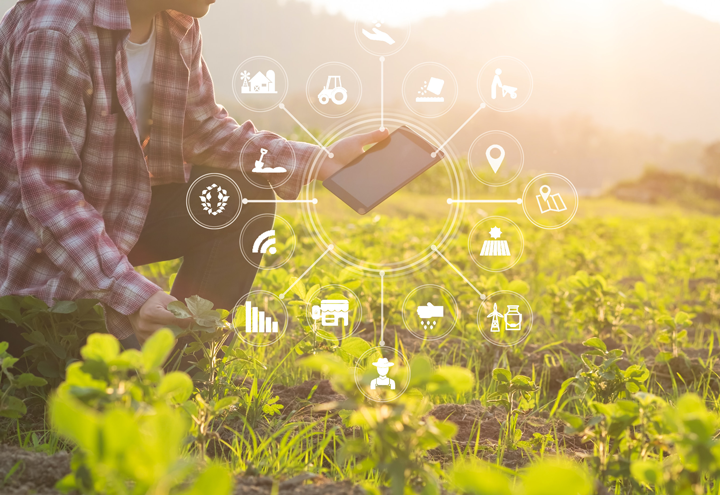Technology and digital innovation have the potential to make a significant contribution towards a step-change in the sustainability, transparency, and resource efficiency of food supply.
 Yara and IBM Launch an Open Collaboration for Farm and Field Data to Advance Sustainable Food Production
Yara and IBM Launch an Open Collaboration for Farm and Field Data to Advance Sustainable Food Production

News From | Yara
Yara International, a global leader in crop nutrition and digital farming solutions, and IBM (NYSE: IBM), invite farmer associations, industry players, academia and NGOs from the food and agriculture industry to join a movement to develop an open data exchange that facilitates collaboration around farm and field data, with the aim of improving the efficiency, transparency and sustainability of global food production.

Use of the open data exchange platform will also make it easier for farmers to track and report information based on local regulations.
Technology and digital innovation have the potential to make a significant contribution towards a step-change in the sustainability, transparency, and resource efficiency of food supply. High quality farm and field data is one of the foundations that can help to make this possible. However, today, farm and field data are typically dispersed, non-compatible and inaccessible. Furthermore, there are important concerns that stand in the way of data collaboration, such as securing the benefits of sharing data broadly, while respecting data privacy for farmers and protecting proprietary information.
To overcome these challenges, Yara and IBM believe a collaborative approach is essential. The Open Farm & Field Data Exchange aims to bring data together from various players to address concrete issues and enable innovation. Sharing data allows farmers to receive higher value services and to be paid in return for sharing their data. Use of the open data exchange platform can also make it trustful for farmers and value chain players to meet potential regulatory requirements.
"It is our collective responsibility to overcome siloes and work together to bring innovation to the way we produce food. The transition towards a more sustainable food system requires data-driven customized solutions for every field and farm. Trusted data sharing is one key element where we can jointly make a difference which will benefit all, from farmers all the way to end consumers," says Terje Knutsen, Yara EVP Sales and Marketing.
Yara and IBM invite early movers from the agriculture and food industry to jointly pilot concrete test cases and define the principles and practicalities of data collaboration. Participants will contribute to the development of a food ecosystem that is designed to enable data-driven innovation, addresses changing consumer preferences and reduces the environmental footprint of food production.
The initiative will be building on the learnings and technology foundation established in the context of the Yara-IBM partnership, which was launched in 2019 as the two companies joined forces to connect and support farmers around the world. The initial focus of the joint work lies on farm and field data management as well as data-driven, joint innovation for farmers, which is already successfully launched in various markets across the world.
With the experience gained the two organizations are now aiming to expand data-driven innovation to a broader community to help feed a growing population in a more sustainable and climate-friendly way, allowing the world to grow more food with a smaller environmental footprint.
"When IBM and Yara developed the first digital farming collaboration, we centered around a joint vision to make a real difference in increasing global farming yields in a sustainable way," said Mark Foster, senior vice president, IBM Services and Global Business Services. "We believe the agriculture industry needs to invest in exponential technologies such as AI, IoT, and big data to help address climate change and population growth as it threatens the world's ability to produce enough food. Together with Yara, we are taking a major step towards transforming the global food system by inviting all food value chain players to join this collaborative movement to help feed the world more efficiently and sustainably."
About Yara
Yara grows knowledge to responsibly feed the world and protect the planet, to fulfill our vision of a collaborative society, a world without hunger and a planet respected. To meet these commitments, we have taken the lead in developing digital farming tools for precision farming and work closely with partners throughout the whole food value chain to develop more climate-friendly crop nutrition solutions. In addition, we are committed to working towards sustainable mineral fertilizer production. We foster an open culture of diversity and inclusion that promotes the safety and integrity of our employees, contractors, business partners, and society at large. Founded in 1905 to solve the emerging famine in Europe, Yara has a worldwide presence with about 17,000 employees and operations in over 60 countries. In 2018, Yara reported revenues of USD 12.9 billion.
Editors Recommendation "Automation and Sensors in Hybrid Greenhouses"
The content & opinions in this article are the author’s and do not necessarily represent the views of AgriTechTomorrow
Comments (0)
This post does not have any comments. Be the first to leave a comment below.
Featured Product

